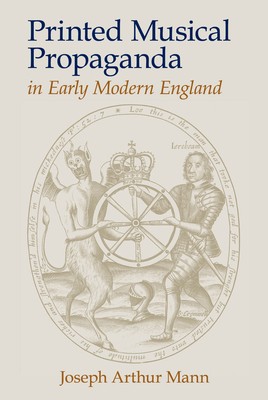
- We will send in 10–14 business days.
- Author: Joseph Arthur Mann
- Publisher: Clemson University Press
- ISBN-10: 1949979237
- ISBN-13: 9781949979237
- Format: 15.5 x 23.1 x 2.8 cm, kieti viršeliai
- Language: English
- SAVE -10% with code: EXTRA
Printed Musical Propaganda in Early Modern England (e-book) (used book) | bookbook.eu
Reviews
Description
Printed Musical Propaganda in Early Modern England reveals how consistently music, in theory and practice, was used as propaganda in a variety of printed genres that included or discussed music from the English Civil Wars through the reign of William and Mary. These printed items - bawdy broadside ballads, pamphlets paid for by Parliament, sermons advertising the Church of England's love of music, catch-all music collections, music treatises addressed to monarchs, and masque and opera texts - when connected in a contextual mosaic, reveal a new picture of not just individual propaganda pieces, but multi-work propaganda campaigns with contributions that cross social boundaries. Musicians, Royalists, Parliamentarians, government officials, propagandists, clergymen, academics, and music printers worked together setting musical traps to catch the hearts and minds of their audiences and readers. Printed Musical Propaganda proves that the influential power of music was not merely an
academic matter for the early modern English, but rather a practical benefit that many sought to exploit for their own gain.
EXTRA 10 % discount with code: EXTRA
The promotion ends in 22d.23:19:19
The discount code is valid when purchasing from 10 €. Discounts do not stack.
- Author: Joseph Arthur Mann
- Publisher: Clemson University Press
- ISBN-10: 1949979237
- ISBN-13: 9781949979237
- Format: 15.5 x 23.1 x 2.8 cm, kieti viršeliai
- Language: English English
Printed Musical Propaganda in Early Modern England reveals how consistently music, in theory and practice, was used as propaganda in a variety of printed genres that included or discussed music from the English Civil Wars through the reign of William and Mary. These printed items - bawdy broadside ballads, pamphlets paid for by Parliament, sermons advertising the Church of England's love of music, catch-all music collections, music treatises addressed to monarchs, and masque and opera texts - when connected in a contextual mosaic, reveal a new picture of not just individual propaganda pieces, but multi-work propaganda campaigns with contributions that cross social boundaries. Musicians, Royalists, Parliamentarians, government officials, propagandists, clergymen, academics, and music printers worked together setting musical traps to catch the hearts and minds of their audiences and readers. Printed Musical Propaganda proves that the influential power of music was not merely an
academic matter for the early modern English, but rather a practical benefit that many sought to exploit for their own gain.


Reviews